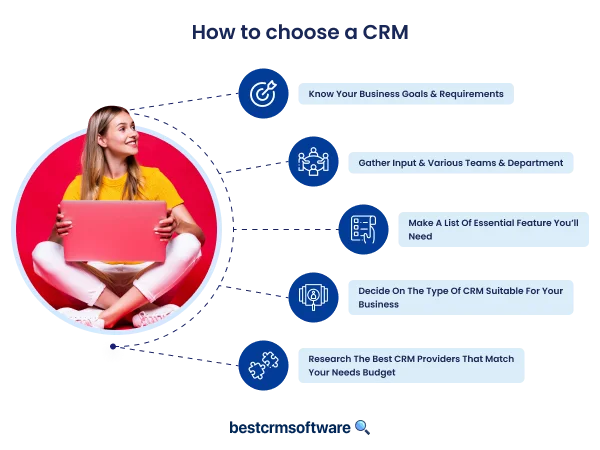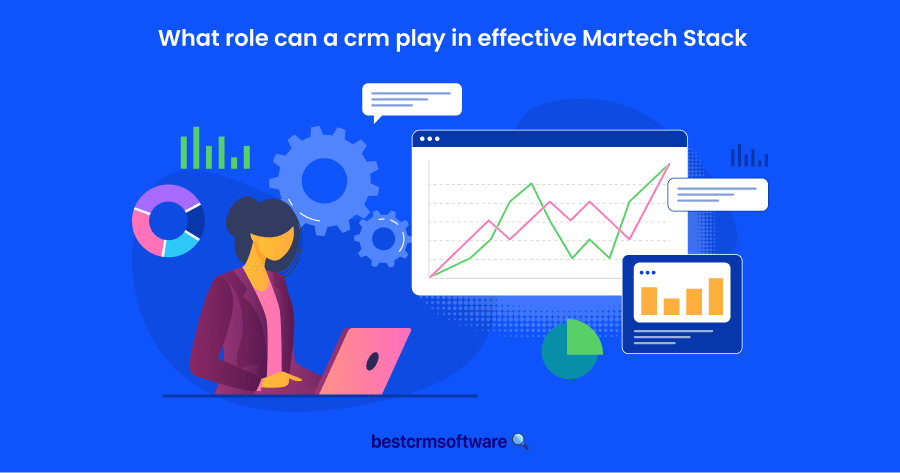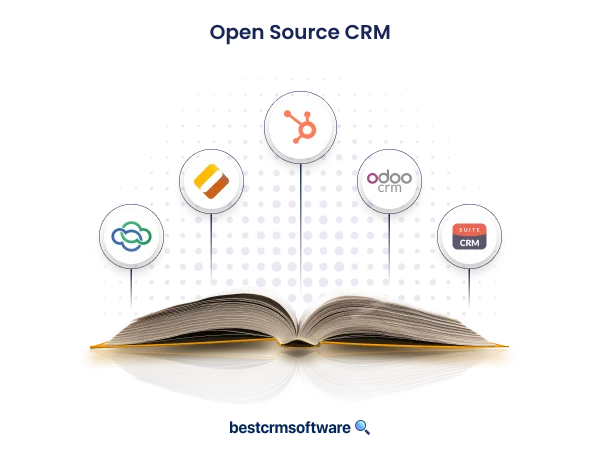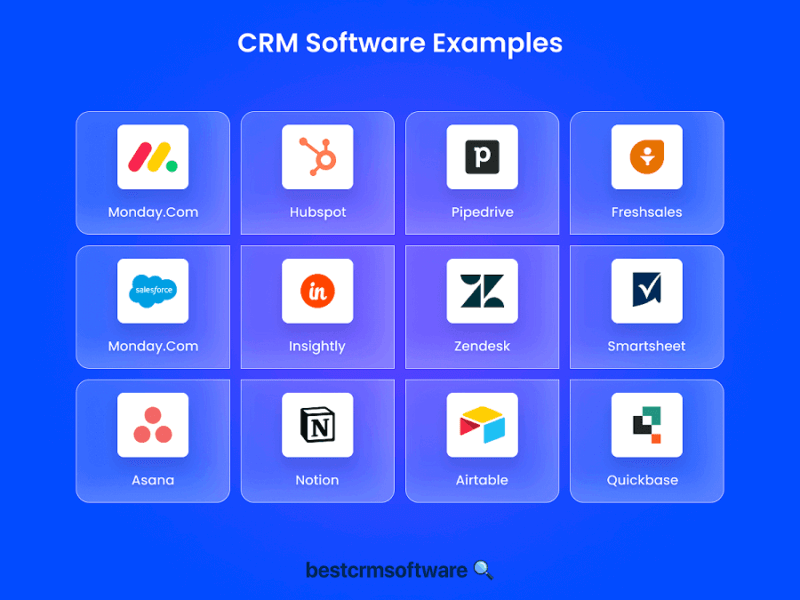
How To Choose a CRM
In A Nutshell
As a CRM consultant, I test, review, and evaluate operational CRM systems. Here are ten things to consider when choosing a CRM.
10 Things To Consider When Choosing A CRM
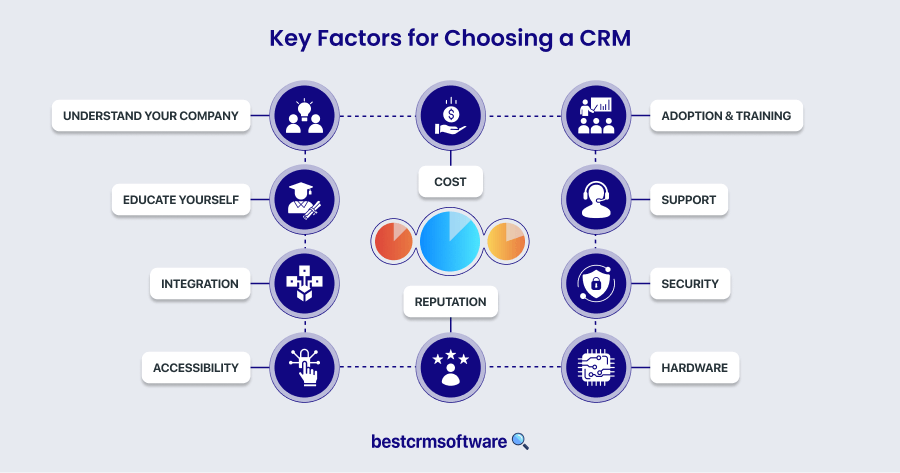
- Understand Your Company: There are many choices, but choosing what works with the company is important
- Educate Yourself About CRMs: Understand everything on a CRM before deciding.
- Adaption & Training: Will your new CRM system be easy to adapt? Will it grow with you?
- Accessibility: Is the CRM on-premise, web-based, or cloud-based?
- Integration: Will the CRM work with my business scheme?
- Support: In case of a problem, can I call someone anytime to fix it?
- Security: Is my company’s data safe with this CRM?
- Hardware: Will I have to change my hardware for this CRM?
- Cost: Is the CRM too expensive? Is it worth it?
- Reputation: Is this a serious CRM brand?
Introduction
With interconnectivity, I can manage my business easily; I would be lying if I said that. In a team or partnership, each individual has their strengths and weaknesses. Everyone chimes in with their talent to make sure the whole team wins. This is human effort. Some gadgets are an extra arm to help manage, guide, and maintain a business. I’m talking about CRMs and how they’re essential to the advancement of any type of company.
A CRM system is software that I need to help my business store and organize all my client’s information, create purposeful marketing campaigns, and keep up with business leads and sales projections. You will find lead management, contact management, and marketing automation with the CRM. All CRMs are different and aren’t limited to these three factors. With constant adjustments, some CRMs have more features. Other factors could be communication, reporting, and analysis.
Understand Your Company
I don’t need to stress this too much, but choosing a CRM solution is a big deal! Your business depends on this decision; you will depend on it, your employees will depend on it, and even more importantly, the client. As we say, I am offering my services, so the client is king.
First, I recommend avoiding offers that are too good to be true. Remember that this choice will not just be for you but for the company. Getting everyone together to talk and target key features would be awesome. It’s best to pick people who meet clients daily to get the best insight. This might make the decision easier.
Once I have made a list of important things for my company, I won’t be swayed by the offers. I know what I want and what my company will need from a CRM. Can your CRM solution do that? This is the mental state you should have when choosing a CRM. If a group of people should decide, everybody should agree on what is strictly beneficial for the company. Make sure that, as a unit, you won’t be easily seduced by the offers. And stick to what you all agreed on.
Educate Yourself About CRMs

You know what you want now, but are you well-informed about CRM? The types of CRM, how they work and all that? Sales reps will say everything and anything to convince a company to choose their solution. Yes, not everybody is a crook, but just know your stuff. Are you familiar with the CRM lingo? Are you familiar with different encryptions when it comes to security?
Do research on what a CRM is supposed to do if you’re starting a business. But if you are looking for a new CRM, the research should focus on what the previous solution lacked. What other features will help your company’s portfolio besides the improvements your company needs? Research how to choose a CRM for a big business or how to choose CRM for a small business.
Adaption & Training
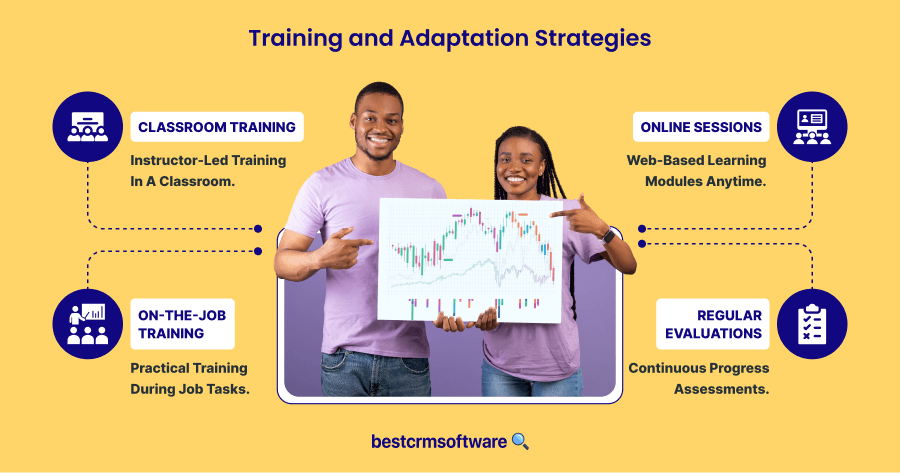
When it comes to CRMs, most of the time, you’ll have to adapt to a few things. But keep in mind that the CRM is there to help. If you’re replacing the CRM in your company, there will be some getting used to. For example, a veteran company might need to change its CRM because it’s outdated. Just imagine the type of CRM they were using. Maybe some features from the old CRM system don’t even exist anymore. Especially if the company uses a CRM system from the 90s, they definitely could with a makeover. Lots of things have changed with CRMs over time.
New business owners might adapt more easily because it’s the first system they use. Compared to the veteran company, they won’t need to change or upgrade anytime soon.
Ultimately, it’s a good idea to have employees have training on how to use the CRM correctly. I believe this should be an obligation for every employee. There should be a small punishment if an employee refuses to comply.
I don’t mean firing, but maybe a suspension or a demotion if things get complicated. This might sound harsh but remember this is a business. If an employee doesn’t know how to use the CRM, it’s a problem. You can’t save time or be productive because the employee will make mistakes and slow everything down.
When employees know how to use the software, they can focus their knowledge on the specific tasks and roles. The training will show employees how to assist the client’s needs and reach the set goals. In time, they will appreciate and value the software.
Learning Methods
I make sure that employees understand what they learn by doing small evaluations. This is to see the strengths and weaknesses. I’ll have a better idea of who to pick for a task. If I notice an employee lacking a skill, I will team them up with someone who fully understands it. This is just one skill the person lacks; obviously, they’re stronger in something else. Having employees who master or just understand a skill is a long-term benefit. For example, who can take their place immediately if one employee falls sick or leaves the company?
The training session must be at a time that suits everybody. Keep in mind the learning style and what the employees prefer in general. Depending on the type of company, there should be different materials and methods. This helps the employees stay focused and motivated. It’s a good thing when employees ask a lot of questions. This means they’re paying attention. Just be sure you have the answers to their questions.
Training Styles
There are many options for CRM software training. I would think about the type of training your employees will follow easily.
- Class training would be a good idea because it’s interactive. Your employees can have direct contact with a trainer and other colleagues.
- The most popular option is online training sessions. Why is it so popular? Because many employees find it convenient for scheduling. Classroom sessions are stricter. The learning material is always available on a device and easy to access. An employer can learn at their own pace. Some sessions have an instructor. Because it’s a digital form, there are videos, evaluations, and sometimes feedback.
- There’s also on-the-job training, which is convenient because it’s practical. The employee learns while they’re working. A supervisor, a colleague, or a mentor teaches them.
Accessibility
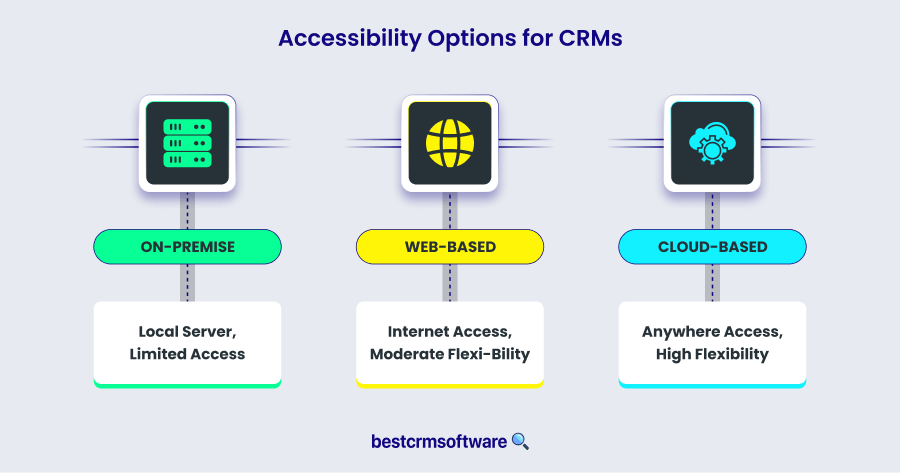
Let us not forget that a CRM’s purpose is to have a relationship with customers and vice-versa. They help us follow up on sales predictions and our customer’s data. So, the chosen solution should be easy to access. Whether on the employee or customer side, it must be user-friendly. Easy access to a CRM will enhance the communication lines with customers. This strengthens their trust in the company. As a result, there’s more revenue.
If employees find the CRM difficult to use, it becomes a chore. Using a CRM is supposed to be a smooth process. You should even be eager to use it when you can. Aside from being user-friendly, a CRM should be inclusive, too. When I say inclusive, I mean anyone can use the CRM tool without a problem.
There will never be a one-for-all CRM solution because different companies have different needs. Each task within a company should be easy to manage through a CRM.
Once again, consider what will benefit the client when thinking of accessibility. Investigate and define what is missing, what risks, and what will hinder people from accessing it. For your business type, maybe you’ll need to think about making it mobile-friendly. Do you need the CRM tool to work on different devices? Does the CRM design have to adapt to different screen sizes?
How To Access
The tools and features of a CRM should be easy to find and access. Have some consideration for individuals who have physical limitations or have needs. Some modern CRMs now include voice-to-text as a feature to be more inclusive.
Cloud-Based Vs On-Premise
Depending on your business model, a cloud-based CRM could be an option. A cloud provider hosts a cloud-based CRM accessed through the internet. Compared to a classic CRM, cloud-based CRMs cost less. They can be accessed anytime and anywhere; I only need an internet connection.
A classic model is only active during the company’s working hours. To use a classic CRM, you must be on the company premises because that’s where the server is. If your business has people who work remotely, this would fit well. If you see web-based CRM it’s the same as cloud-based.
Integration
I mention integration because I wouldn’t want to work by going back and forth between CRM systems. I would like the move from one system to another hassle-free. Integration is the part where you connect other applications to your CRM. With successful integration, the flow of information between the applications is effortless. Research lets you find a CRM solution with integration tools and connectors. These will help connect second or third-party tools to the CRM system.
I don’t know what type of business you have, but applications for accounting, inventory, purchasing, warehouse, marketing, and salesforce automation can be included in third-party systems.
As mentioned, integration is simple when the CRM has integration tools and connectors. There will be less coding and technical assistance required. The integration will be fast, and the company will back-process client data quickly.
You see that how to choose a new CRM for the company is an important step. Take this into consideration when you decide.
Support
To be clear, I’m not talking about how CRM systems help your customers when there’s a technical issue. I’m talking about support and technical when the CRM has a problem. This point should be covered while you and your team have a training session on the CRM you chose. With any CRM, expect to occasionally have smaller training sessions on the CRMs latest updates, new features, and new technical problems.
CRMs generally have a reporting system, like the black box in aircraft. Even if there’s a crash, just find the black box which will tell you how the crash happened. Thanks to this reporting feature in CRMs, developers identify new problems and work on a solution.
What’s the next step if there’s a glitch in the system? You can’t waste too much time either. This CRM has a problem, so employee and customer tasks can’t be done. What is the procedure to start up the CRM?
The first thing I advise is to identify the actual problem. The problem might be big, but breaking it into smaller sections ensures a faster resolution.
Whatever the problem, make sure there are clear rules to follow. Identify how serious the problem is so you can take action. If it’s solvable, great, but if this is an issue the software developer should fix then waste no time contacting them.
Security
When choosing a CRM solution, consider security because you have important client information and the business recorded on the system. To go back to the previous point about knowledge, do you know the vocabulary regarding security? You’ll be presented with different security systems, monitoring styles, encryptions, authentication processes, strong passwords, etc, but which is better for the company? Think of possible security problems that could arise in your line of business. This is why CRM systems updates are important.
Trust from your clients is key to your company’s growth. Don’t throw this out the window by neglecting security features. I would rather spend more on security today because I know it will soften the blow in the future if anything happens.
Encryption
I have often mentioned encryptions; some still don’t know what that is. Encryption is a process that makes data unreadable. You’ll need a special password or digital key to access the data. This is what ensures that stored data isn’t stolen or leaked.
When data travels between your CRM and other devices or systems, an outside source won’t be able to read it because it’s encrypted. It’s only when it arrives at the destination that the data becomes accessible. Data shouldn’t only be encrypted when it’s traveling but also when it’s stored. Usually, encryption features are provided directly from the CRM or a third party.
Access management
Ensure that a system is in place that permits certain people to access stored data. This management system will determine who can see, edit, and remove data. You should find a CRM that creates user roles and profiles. You can assign these to employees who have important roles in the company.
Data backup
Think of the type of backup system in case information gets lost. This could be because of a cyber attack, hardware failure, corruption, a natural disaster, or simply deleting by accident. Backup makes copies of all customer data and stores them in a secret place.
What I’ve just explained are automatic procedures. Have the habit of doing backups regularly. Don’t just rely on the system to do it by itself. Make sure that backup files are easy to integrate and use.
Hardware
How to choose a CRM or how to choose a new CRM will also depend on the hardware. If this is a new business look into current hardware. If the business is in the process of changing the CRM, find out what the minimum requirements are. You don’t need to be an engineer, just know the basics about suitable hardware for CRM.
Input Device
This allows you to put in a command, which the computer executes. The common input devices are the keyboard and mouse. Other input devices assist with transfers between computers. Will the keyboards and mouse work well with the CRM?
Output Device
Monitors, speakers, and printers fall under output devices. They send data to other devices or users. They also provide audio and graphics.
Processing Devices
Information processing happens between the input and output devices; this is what computers were made for. During the processing stage, raw data is turned into information for the user. Here, a CPU is the best example of a processing device.
Memory Device
This component includes devices that can store information for a long or short period. A primary memory device example would be RAM. RAM stores information and instructions for a short period before and after processing. A secondary memory device would be an external storage medium. I mean a flash drive, where information can be stored longer.
Cost
Many CRM providers will present you with different packages. Just be wise and think about this decision in the long term. By now, you’ve done all the research, ticked the boxes, and know which CRM will be suitable. The only hindrance might just be the cost.
If it’s possible to have a trial period with a certain CRM, do so. This will give you more insight into how the CRM works. The feedback from your employees and clients on this CRM is key. Why not if you have to try several CRMs on a trial basis? This is your money, after all.
Reputation
I don’t want to discourage or discredit using new and upcoming CRM tools. There are many perfectly good, new CRM solutions out there, so bear them in mind as well as the more established ones. You may be pleasantly surprised with what they can offer your business. New CRM systems have undoubtedly studied the market, identified current issues, and developed features that will improve upon them. Most will have a trial period to encourage you to adapt their system.
Of course, in the business domain, reputation will speak for a company. New CRM systems may be excellent, but they’ll have to compete with brands already making a name for themselves.
Nobody can blame you if you choose a CRM company that’s been there for years. They have more experience, more knowledge and are probably up to date with the newest trends in CRMs.
Conclusion
Making an informed decision is when you have looked at the angles, the in and outs, the risks, and not only the benefits. The key thing is knowing what the business needs to cater to clients and strengthen relationships. The other important facet of your business are your employees. They need to be well-versed in the knowledge and use of CRM like you. Both parties’ feedback helps to decide choosing the correct CRM.
I hope this has helped you to understand how to choose a crm system. The key is having a clear understanding of your company’s processes and direction, and matching the right product to that information.
Check out our other blogs too! Our CRM experts publish helpful content daily, ranging from how-to guides to in-depth articles on what a CRM database is.


